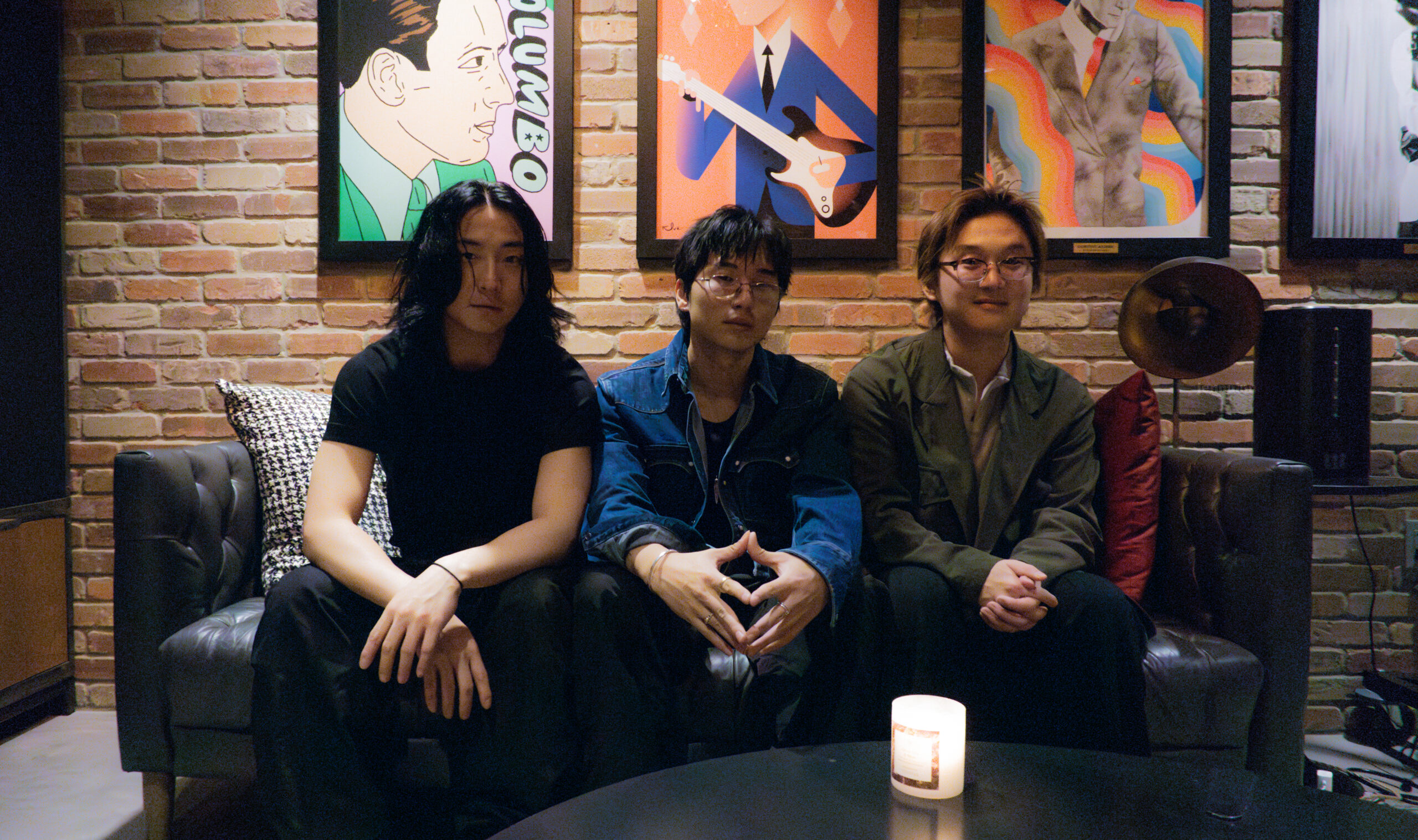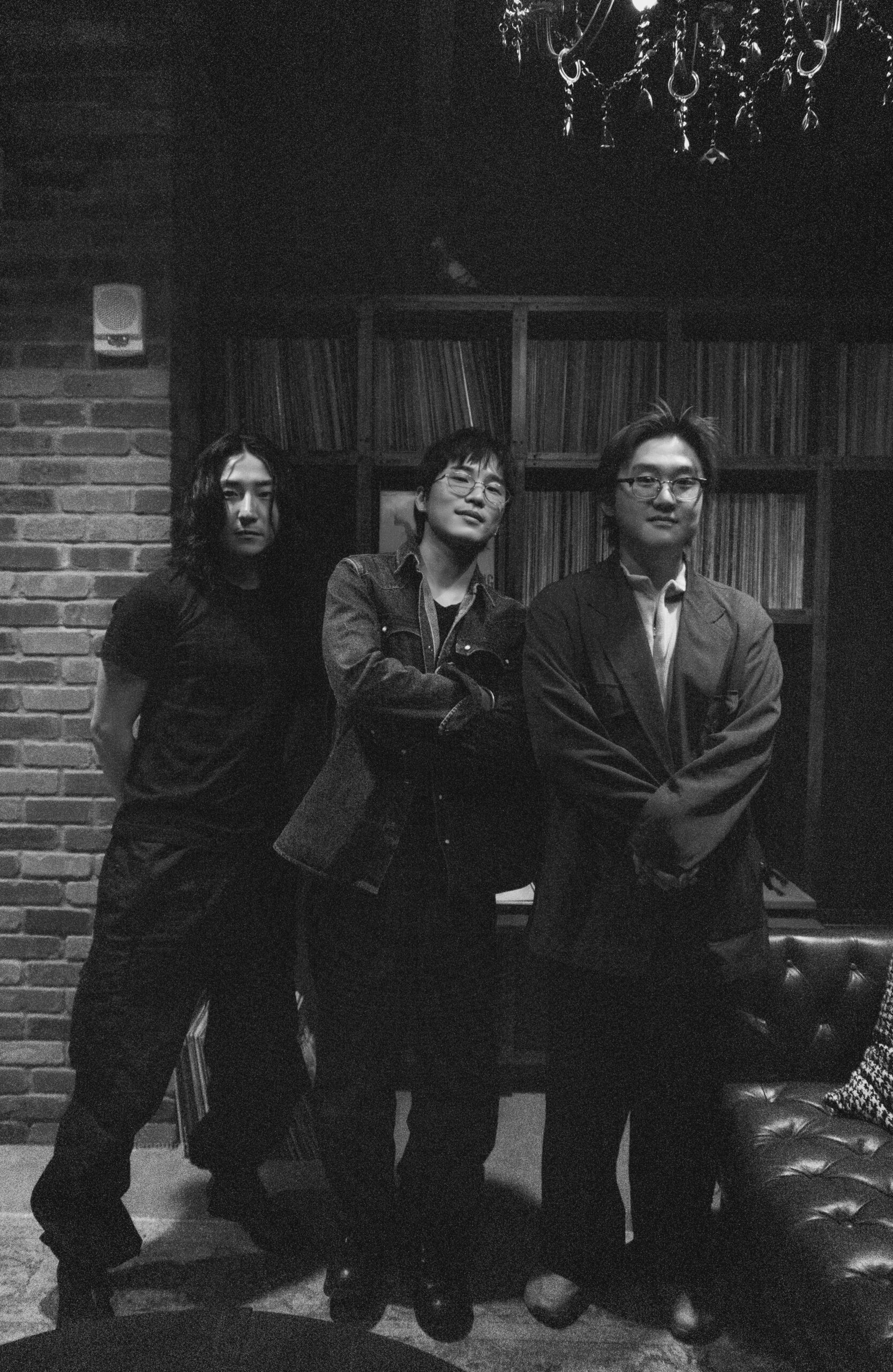Wave to earth frontman Daniel Kim confesses he believes that their records will be timeless. When I ask him what makes him so certain that they will attain that kind of permanence, he says it’s instinct. Soonjong “John” Cha aka Potatoi, bassist, insists that Kim just has a gut feeling for what works and what doesn’t. Dong Q, the drummer, nods his head in agreement.
Their music is influenced by artists that they enjoy listening to. Kim says he’s been listening to Ryan Beatty, who has frequently collaborated with BROCKHAMPTON. Dong Q mentions that Oasis, an English rock band from the 90s, is one of many who inspire their work. However, wave to earth’s consistent efforts to create work that is representative and authentic to their own musical interests has enabled them to create their distinctive lofi-jazz-surf-rock sound. Even if it’s not clear if the band’s ever gone surfing.
“This album is a version of ourselves and what we like at this moment, and in this era of our musical journey,” Dong Q says. “We try to do it as purely as possible, being honest to ourselves.”
Kim’s conviction that their music will stand the test of time comes easily, especially when they’ve sold out shows on two North American tours, and people begin to gasp and scream and chant immediately after the lights flick off. It felt almost fated that the New York crowd’s amateur sopranos would scream Kim’s birth-given, Western name louder than those of the other band members. In some ways, the familiarity of a name that rolls easily off the tongue of a Western audience was a testament to his and wave to earth’s inevitable global appeal. Afterall, wave to earth had been born from Kim’s imagination.
Most of their songs are written in English. They say that this is a deliberate decision because “the language fits better sonically. And our fans are majority English speakers.” Dong Q and Kim stated that they had always intended for the band to go global.

When wave to earth got on stage, they had no words for the crowd. Instead, their greeting took the form of Dong Q hitting the drums; the music spoke for itself and demanded respect. There weren’t profusely sweaty bodies, crowd surfing or mosh pits. Instead, the typical metrics of a rock band were fulfilled by the enthusiasm of their devoted fanbase – fans eagerly crowded around the merchandise table, belted out lyrics in “사랑으로 (love.)”, and drank copious amounts of beer. One young woman had to be dragged out by her friend, propped up by strangers, after she tripped over her own feet on the stairs after drinking too much.
Their Brooklyn show was the final stop of their completely sold-out 2024 North American tour. The night prior, they had performed in Manhattan at Hammerstein Ballroom. The location couldn’t shake their nerves, though; the group stated that before each performance, they would pray to God – usually a variation of the same prayer each time. “Glory to God,” Cha says while pointing his finger to heaven. “Those phrases that help us maintain our strength there and always remember why we’re doing it [performing].” Their faith keeps them grounded, especially when they’re so far from home.
The band, although named wave to earth, is very down-to-earth; their comforts remain rooted in familiarity. Cha reveals that although the tour has only been less than 2 months, he’s been so homesick that he’s returning to Seoul two days earlier than everyone else.
When describing the origin of their song “Homesick” in wave to earth’s auto-documentary, Kim retells one day he realized his plants had grown so much – even though he hadn’t taken deliberate daily notice. “Even in the moments when I was lost, I kept growing,” he says to their camera.
Kim says this kind of unspectated growth is similar to their band’s rapid rise on the global stage. “Before, we used to check on what our progress was in terms of modern music stream or the size of the shows. But now, we’re indifferent about it. We’re focused more on trying to figure out what we want to do, and focus on how to get there. Not about streaming, but more about setting up the next benchmark. Trying to answer the question of ‘what [more] do you want to do?’” Cha nods his head, as though he’s all too familiar with Kim’s traveling antics. “There’s always things to do for him, both on and off tour, whether that’s songwriting or prepping for the next tour.”
On the road however, Kim reveals that he “feels more free” because he is able to focus on being just a person rather than creating music for wave to earth or his other band, The Poles.
Cha has a different approach to tour life. He is constantly thinking and writing. He recalls one instance of this in San Diego. “There was a park around the venue, and when inspiration came in, I made a demo. The main kind of process is in the studio, but sometimes it just happens.”
The bassist is also the main lyricist for the band, and spends a lot of time reading self-improvement books. “I like Atomic Habits,” he says. It makes sense, given that he has been the main writer for the band, and was the one who created “Annie.”, the most popular song on their album play with earth! 0.03.
A Genius article wrongfully assumes that the song is written from Kim’s perspective, and insinuates that Annie is Daniel’s romantic partner who doesn’t want to live a life that is not in opulence. But Cha reveals that he is the writer of the song, and the title is a play on words for 아니 “an-ni” like saying no, 아니요 “aniyo,” in Korean. It’s a song about rejecting the societal and secular notions of what is necessary for success, instead embracing the simple pleasures of life.

Wave to earth’s manager, Jaemin Chun, mentions that the song being written by Cha makes the most sense, as it would be contradictory if it had come from Kim. One specific situation comes to mind: Chanel, the luxury fashion house, typically selects one magazine in countries around the world to throw a branded party with. In Korea, they’d chosen Eye Magazine. Their Editor-in-Chief was friends with Chun, who had “asked if the boys wanted to come.” Apparently, Cha had already replied back, “Sorry, I don’t really like doing things like that, but let’s do dinner some other time.” But Kim attended briefly, as though to hold it down for the group.
Where would they rather be? In the studio, working towards future projects. With 0.1 flaws and all, the group had started early last year with a “studio lock in,” meaning they were solely focused on creating music. Like the prayers, the band adheres to rigid rituals and discipline to ground their work in their life. These routines allow them to return to their core purpose amidst fame. Kim said that this method of staying in the studio will probably be their method “for all of our albums, like forever.”
Kim intends on building a studio with five or six rooms – right now, it is at three. The first thing he thinks people would see would be their coffee machine where they typically make their iced Americano. All in all, the current studio set-up and all their personalized amenities have made the lock-in process significantly less painful.
In the past, Kim has suffered physically from his own devotion to his work. He revealed that he has pushed himself too hard, consequently getting urticaria (hives). He’s been taking antihistamines for the past five years, although long-term use of these medications is not advised due to drowsiness, dry eyes, mouth and sinuses as potential side effects. He sacrifices himself for his art, giving every song some sort of vital, sacrificial feeling.
The rest of the band feels their music to their core, too. Cha’s own hopes for the future, and his lifestyle of manifestation, comes through in the songs’ lyricism. Dong Q had confessed in their auto-documentary that after writing “사랑으로 (love.)”, he had tears falling on cymbals. Visceral emotion came through after writing and composing the song. That’s how the band knew what they were making was real.
“For him, it’s instinct,” Cha says about Kim. “When we go into the production stage with the songs, he just instinctively knows it. He knows.”
The band even knows it on stage. In the transitory periods between songs on their setlist during the first few shows, they were improvising. In essence, it was an exercise in trust and surrender to oneself and their bandmates. This fluidity between structure and spontaneity is what makes their performances feel alive and organic.
This is the magic of music – it’s ability to be repeated over and over, but still be refreshing each time. While each venue they played had a different energy and slightly new rendition, the songs remained the same. Each improvisation would eventually become a permanent fixture in their set; fluidity became structured. By their last show in Brooklyn, the drum and bass solos had been perfected. In other words, every performance’s beautiful chaos had become easier to reenact. Their work was truly preserved in time, just as Kim had always hoped for – a sense of timelessness.
While playing these songs again didn’t literally turn back time, the familiar notes carried the power to transport both the band and their audience to the past—back to the moment the song was first created, or to a memory of love tied to its melody. This act of reliving, of evoking the emotions of another time, is what made the music feel timeless—a bridge between past and present that preserved its magic.
It’s not always easy though, and they don’t expect it to be. Seasons change. Although the start of the band and their debut album was bright – Kim had created the demo for “Sunny Days” immediately after meeting with Dong Q – there were some inevitable cloudy days, too. They admitted that there was no antidote or quick fix for the challenges they face as artists and people. Instead, they just live through it; they feel it all without resistance.
For wave to earth, music isn’t just a product, but a way to connect. Though some days feel slow, they willingly endure their own creative struggles—not because anyone demands it, but because they feel compelled to make music for themselves. That their art resonates with global fans is merely a fortunate byproduct of this deeply personal journey.
Their absolute devotion to their craft is what gives their music timelessness, a vessel for raw emotion. When they sing about love and the crowd joins in while holding hands, it feels authentic and real.
They hope to come back to New York and play an even bigger venue. From 2023 to 2024 then a hopeful 2025, each performance stitches them into the city’s memory, their music taking on that quality of timelessness. Every time the music begins, they invite the audience to genuinely feel together – flaws and all.
